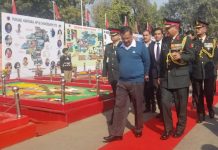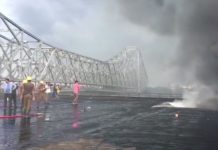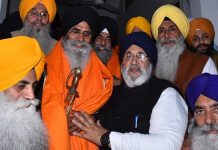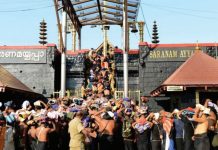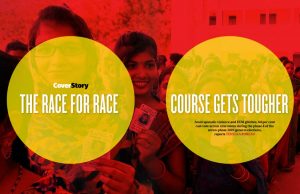 Held in 72 constituencies across nine states on April 29, the fourth phase of the Lok Sabha elections recorded 64 per cent turnout amid incidents of violence in West Bengal and EVM glitches at some booths.
Held in 72 constituencies across nine states on April 29, the fourth phase of the Lok Sabha elections recorded 64 per cent turnout amid incidents of violence in West Bengal and EVM glitches at some booths.
In Rajasthan, 67.13 per cent turnout was recorded in 13 Lok Sabha seats. Tribal dominated seat of Banswara recorded the highest voting percentage at 72.34, followed by Barmer which recorded 72.21 per cent voting. An average 66.09 per cent voter turnout was recorded in Madhya Pradesh across six Lok Sabha seats.
Uttar Pradesh, meanwhile, witnessed a 57.58 per cent voting in 13 constituencies in the state. Phase 4 polling was held in Shahjahanpur, Kheri, Hardoi, Misrikh, Unnao, Farrukhabad, Etawah, Kannauj, Kanpur, Akbarpur, Jalaun, Jhansi and Hamirpur constituencies that stretch from the terai bordering Nepal in the north to the arid Bundelkhand region bordering Madhya Pradesh in the south. Kanpur was the sole major city and industrial centre in this belt. Etawah, Kannauj region was a stronghold of the SP and Dimple Yadav, wife of SP leader Akhilesh Yadav, had won the Kannuaj seat in 2014.
Bihar remains peaceful
A total of 58.92 per cent of the 87.74 lakh electorate cast their votes in five Lok Sabha constituencies in the fourth phase of polling in Bihar. The voters exercised their franchise on 8,834 polling stations to decide the fate of 66 candidates. The polling percentage of the five constituencies could increase once the final figures reach the state election office in the state, the official said. “A total of 58.92 per cent voting was recorded in five Lok Sabha constituencies of Darbhanga, Ujiarpur, Samastipur, Begusarai and Munger. It was around 2.74 per cent higher in these five seats compared to 2014 general elections,” Chief Electoral Officer (CEO) H R Srinivasa told reporters here.
Earlier, the Election Commission had issued notice to Union Minister and Begusarai (Bihar) BJP candidate Giriraj Singh for a speech delivered on April 24 in GD College, Begusarai. Giriraj Singh had reportedly said “Who don’t say Vande Mataram, can’t worship motherland. My father and grandfather died by banks of Ganga and did not need a grave. But you need three-arm’s-length of land. If you don’t do it, the country will never forgive you.”
Begusarai witnessed the highest turnout of 61.27 per cent, while Samastipur recorded 60.80 per cent, Ujiarpur 60.56 per cent, Darbhanga 56.68 per cent and Munger 55.38 per cent, Srinivasa said. “Polling passed off peacefully with no incidents of any violence barring three incidents of poll disturbances at four polling booths at different places in Munger Lok Sabha constituency,” the CEO said.
In Jammu and Kashmir, less than nine per cent of 3.45 lakh electorate exercised their franchise in the Kulgam district– part of Anantnag Lok Sabha constituency — amidst stringent security arrangements and isolated incidents of stone-pelting near polling stations.
In Odisha, an estimated 64.05 per cent of the 95.06 lakh voters exercised their franchise in six Lok Sabha seats. The state also saw simultaneous polling in 41 assembly constituencies. Polling is not being held in Patkura assembly seat, where voting will be held on May 19 following the death of the BJD candidate.
Violence in West Bengal
West Bengal recorded a high turnout at 76.47 in the eight seats though clashes broke out between supporters of rival parties in Nanoor, Rampurhat, Nalhati and Suri areas of Birbhum seat, leaving several people injured.
In Barabani, BJP candidate from Asansol and Union minister Babul Supriyo’s vehicle was vandalised allegedly by TMC workers outside a polling station while in Dubrajpur area central security forces personnel reportedly opened fire in the air to disperse irate people who attacked them when they were barred from entering the booths with mobile phones.
An FIR was registered against Supriyo for allegedly getting into an argument with polling officials, an election official said. The ruling Trinamool Congress and the BJP accused each other of intimidating voters in the state, which has seen violence in all previous three phases despite stepped up central forces deployment.
The stakes are high for the BJP which had won 56 of the 72 constituencies in the 2014 polls. About 12.79 crore people were eligible for voting in the phase, which marked the start of polling in Rajasthan and Madhya Pradesh while elections came to an end in Maharashtra and Odisha.
EVM glitches
The Congress made 30 complaints to the Election Commission about alleged glitches in EVMs across the 17 Lok Sabha constituencies in Maharashtra. A majority of the complaints came in from Dhule and Nandurbar, the party said, prompting ally NCP’s state chief Jayant Patil to claim that something was “fishy” in the two seats.
Complaints of technical glitches in EVMs and VVPAT machines in some polling booths were addressed in Maharashtra, an election official said.
In Uttar Pradesh, opposition Samajwadi Party’s alleged that many EVMs malfunctioned and in Kannauj, from where SP chief Akhislesh Yadav’s wife and sitting MP Dimple Yadav is contesting, several party workers were prevented from coming out of their homes to vote.
In Kanpur, BJP workers allegedly tried to barge into a polling booth and clashed with the police. A case has been registered against BJP leader Suresh Awasthi and six others in this connection, Kanpur District Magistrate Vijay Vishwas Pant said.
Shahjahanpur (SC), Kheri, Hardoi (SC), Misrikh (SC), Unnao, Farrukhabad, Etawah (SC), Kannauj, Kanpur, Akbarpur, Jalaun (SC), Jhansi and Hamirpur seats recorded 53.23 per cent polling till 5 pm, an electoral officer said. Reports were received of EVMs developing snag in Bidhauna area under the Kannauj Lok Sabha seat following which polling remained suspended for over an hour.
Complaints of EVM malfunctioning were also reported in Etawah under Auriaya district, with voters claiming they had to wait for hours at polling booths in Tilak Mahavidyalaya, Sahupur, Ajitmal and Dalelnagar to cast their votes. According to a report from Hardoi, an elderly woman voter complained that the presiding officer at Jamkara booth under Sandila area forcibly pressed the EVM button. The sector magistrate has removed the officer and handed him over to the police, who is investigating the matter.
Besides Dimple Yadav, prominent candidates whose electoral fate will be decided in this phase are Dimple Yadav, former Union ministers Salman Khurshid (Farrukhabd) and Sriprakash Jaiswal (Kanpur) of Congress, UP Cabinet minister Satyadev Pachauri (Kanpur) and Sakshi Maharaj of BJP (Unnao)
Chief Electoral Officer (CEO) of Madhya Pradesh V L Kantha Rao, meanwhile, said that during a mock-poll, electronic voting machines (EVMs) were replaced at 207 polling booths as some glitches were found. EVMs were also replaced at 106 polling booths after the voting began.
Polling was peaceful in Rajasthan, with tribal dominated seat of Banswara recording the highest voting percentage at 72.34, followed by Barmer which recorded 72.21 per cent voting, according to state election officials. Nearly 52 per cent voting was recorded in Maharashtra (17 seats), 64.05 per cent Odisha (6 seats), 53.67 per cent Bihar (five seats) and 63.42 per cent Jharkhand (3 seats), according to data provided by the Election Commission.
In Jharkhand’s three parliamentary constituencies – Lohardaga (ST), Palamu (SC) and Chatra, a turnout of 63.40 was recorded. Prominent among those in the fray were Union Minister of State for Tribal Affairs and BJP’s Lohardaga candidate Sudarshan Bhagat, who was pitted against Congress MLA and Mahagathbandhan’ candidate Sukhdeo Bhagat. “An estimated 63.77 per cent polling was recorded by 5 pm and it will increase,” Chief Electoral Officer L Khiangte said after the end of the polling.
The polling began at 7 am and ended at 4 pm. As per the instruction of the Election Commission voters, who entered polling stations before the scheduled time would be allowed to vote. The voting passed off peacefully, the CEO said. An FIR was lodged against a polling personnel at a booth in Hussainabad in Palamu constituency when it was found during webcasting about his inconsistent behaviour. The officer concerned was immediately replaced by another polling personnel from the reserve, he said. The CEO said some EVMs were immediately replaced after malfunctioning was reported.
Inspector General of Police (Operation) Ashish Batra said that not a single disruption of polling was reported during the elections for the three constituencies as 40,000 para-military forces and other state police forces were deployed to oversee peaceful polling. Braving the summer heat, family members of a 94-year-old man took him in a cot to cast his vote at Loharsi in Chatra Lok Sabha constituency. There was no incident of violence anywhere in the three Lok Sabha constituencies during the day, the police said.
In Kulgam district of Anantnag constituency in Jammu and Kashmir, 10.3 per cent polling was recorded, amid isolated incidents of stone pelting. This was the second of the three-phase polling in the sensitive seat.
In Bihar, voting was delayed due to EVM malfunctioning at three polling stations in Munger, two polling stations in Darbhanga and three polling stations in Begusarai, from where CPI’s Kanhaiya Kumar and Union Minister Giriraj Singh (BJP) are contesting, due to technical glitches. In Odisha, technical glitches in EVMs delayed polling in 60 booths, but it resumed after the snags were rectified, an official said.
Election to 542 Lok Sabha seats is being conducted in seven phases between April 11 and May 19. Election in Vellore constituency in Tamil Nadu has been cancelled following excess use of money power. Results will be declared on May 23.
A BJP delegation of Mukhtar Abbas Naqvi, Vijay Goel and Anil Baluni met the Election Commission (EC) on April 29 to complain about poll-related violence in West Bengal. There were reports of clashes between Trinamool Congress and BJP workers outside a booth in Barabani in Asansol, following a tiff between sitting MP and BJP candidate in Asansol, Babul Supriyo and polling officials inside the station, said an Election Commission source. Babul Supriyo’s car was also vandalised in the clash.
“I have come here just to see how the polling process is underway, but I found that voters are not being allowed to cast their ballots. Our fight is to establish democracy… It is shameful that I am saying this in a democratic country,” the minister said.
Voters queued up outside polling booths in Asansol’s Jemua village complained that there were no central forces deployed at the booths and they feared to cast their votes. Babul Supriyo also engaged in a bitter war of words with Trinamool Congress agents at a polling booth where the two sides argued and hurled abuses at each other. Trinamool Congress, too, has moved EC complaining about central forces firing inside a polling booth in Dubrajpur under the Birbhum Lok Sabha constituency.
Madhya Pradesh Chief Minister Kamal Nath was among the early ones to cast his vote in the fourth phase for the Lok Sabha polls in the state’s Chhindwara seat, where his son Nakul Nath is the Congress’ candidate. The chief minister along with his wife, son and daughter-in-law arrived at a polling booth in Shikapur area to exercise their franchise. Power supply tripped briefly when the chief minister and his family members were inside the polling booth, election micro-observer Narendra Singh Sisodia told PTI. Polling began in the morning in six Lok Sabha seats of the state and by-election to Chhindwara Assembly constituency, where the chief minister is in the fray.
The Lok Sabha constituencies of Sidhi, Shahdol, Jabalpur, Mandla, Balaghat and Chhindwara are going to polls in the first phase of general elections in the central state. A poll official said Nath would not be able to exercise his democratic right in the Chhindwara Assembly bypoll as he is a registered voter from Saunsar Assembly seat. Barring the Naxal-affected Baiher, Lanjhi and Paraswada Assembly segments under Balaghat parliamentary seat, polling will be held from 7 am to 6 pm, a poll official said.
In the Naxal-affected areas, polling will be held from 7 am to 4 pm, he added. Total 108 candidates are in the fray in the six Lok Sabha seats, including maximum 26 in Sidhi, followed by Balaghat-23, Jabalpur-22, Chhindwara-14, Shahdol-13 and Mandla-10. Nine candidates are trying their luck in the Chhindwara Assembly bypoll. In 2014, riding on the ‘Modi wave’, the BJP won five of these six Lok Sabha seats.
Congress veteran Kamal Nath had won from his bastion Chhindwara, where his son Nakul Nath is the party candidate this time for the Lok Sabha polls. After taking over as chief minister following Congress’ victory in the last year’s Assembly polls, Kamal Nath needs to get elected to the state Legislature within six months. Congress MLA Deepak Saxena quit from the Chhindwara Assembly seat to make a way for him.
In Uttar Pradesh, Opposition Samajwadi Party urged EC to remove police chief OP Singh from the post alleging he was “favouring” the ruling BJP and affecting elections. The party also alleged that in at at least two polling booths the Voter-Verifiable Paper Audit Trail machine showed the voting for the BJP when the ballot was cast for the SP. Over 100 polling booths were replaced in Rajasthan due to malfunctioning after voting began.
Bogus Votings
Former Union Minister Jitin Prasada said his sister was unable to vote because her vote had already been cast by the time she reached the polling booth in the Dhaurhara Lok Sabha seat in Uttar Pradesh. “When my sister went to the polling booth, she found her name had been ticked and the presiding officer told her that vote had been cast. This is how fake voting is taking place,” he said, adding that he would take up the matter with the Election Commission. The District Magistrate and Returning Officer Amrit Tripathi said her name was ticked due to the fault of a polling employee. He says Mr Prasada’s sister will be allowed to vote if she came to the polling centre again.
Chief Electoral Officer of Rajasthan has sought a report after some voters in Jodhpur had leveled charges of bogus voting alleging that their votes had already been cast and when inquired, they were told that nothing can be done now.
Stars & billionaires vote
Billionaires and Bollywood stars lined up outside polling stations along with the common folks in Mumbai, which recorded 51.11 per cent voting, almost similar to the voting percentage of 51.59 in the 2014 polls. Bollywood celebrities including Amitabh Bachchan, the Khan troika of Shah Rukh, Salman and Aamir, and Deepika Padukone cast their votes in Mumbai. Priyanka Chopra, Rekha, Aamir and wife Kiran Rao were among the early voters. Polling was held in six constituencies in Mumbai and 11 other seats in Maharashtra.
The Ambanis, Tata Sons chairman N Chandrasekaran and Adi Godrej were among the early voters in Mumbai. Mr Chandrasekaran and his wife voted at a polling booth at Worli in Central Mumbai, while Mr Godrej cast his ballot in the Malabar Hill area in south Mumbai. Reserve Bank Governor Shaktikanta Das also exercised his democratic right near his official residence at Pedder Road.
Others to cast their votes included Anil Ambani, who came in early at a booth in Cuffe Parade, and auto major Mahindra and Mahindra’s managing director Pawan Goenka, who cast his vote in suburban Juhu. Ashish Chauhan, the managing director and chief executive of Asia’s oldest stock bourse BSE, also cast his vote, as did American brokerage Morgan Stanley’s managing director Riddham Desai. Chairman of Mahindra Group, Anand Mahindra, after casting his vote in Malabar Hill, says: “We all have been infected by the virus of progress and growth. Even if a coalition govt comes, it should work towards progress and growth of the country.”
Criminal records
According to the National Election Watch and Association for Democratic Reforms (ADR), a total of 210 candidates who contested in phase 4 of the Lok Sabha elections were facing criminal charges, with 158 having serious cases and 12 of them convicted cases. Five candidates had declared cases related to murder, 24 had declared cases related to attempt to murder, four had declared cases related to kidnapping, 21 had declared cases related to crime against women and 16 candidates had declared cases related to hate speech.
The ADR had analysed the self-sworn affidavits of 928 out of 943 candidates contesting in the Lok Sabha phase four across 71 constituencies in eight states. “There are 15 candidates who have not been analyzed due to unavailability of properly scanned and complete affidavits, at the time of making this report,” the ADR had said. It said 210 out of 928 candidates analysed face criminal charges. “A total of 158 out of 928 candidates analysed have declared serious criminal cases and 12 candidates have declared convicted cases.”
In terms of parties, 25 out of 57 candidates from the Bharatiya Janata Party (BJP), 18 out of 57 candidates from Congress, 11 out of 54 candidates from Bahujan Samaj Party (BSP), 12 out of 21 candidates analysed from Shiv Sena and 60 out of 345 Independent candidates have declared criminal cases, few news agency reports highlighted.
“Among the major parties, 20 out of 57 candidates from BJP, 9 out of 57 candidates from Congress, 10 out of 54 candidates from BSP, 9 out of 21 candidates analysed from Shiv Sena and 45 out of 345 Independent candidates have declared serious criminal cases,” the ADR said, adding that 37 out of 71 constituencies have three or more contesting candidates who have face criminal charges.
There were about 12.79 core voters in Bihar, Madhya Pradesh, Jharkhand, Maharashtra, Rajasthan, Odisha, Uttar Pradesh, West Bengal and Jammu and Kashmir. The number of candidates was 972. While 17 seats in Maharashtra went to polls in the fourth phase, 13 seats each in Rajasthan and Uttar Pradesh, eight in West Bengal, six in Madhya Pradesh, six in Odisha, five in Bihar and three in Jharkhand voted on April 29.
The election, the world’s biggest democratic exercise with about 900 million voters, started on April 11 with PM Narendra Modi in the lead. The last phase of voting is on May 19, with results released four days later. There are a total of 545 seats in parliament’s lower house.
letters@tehelka.com







